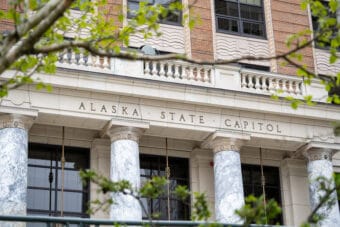
The Alaska Federation of Natives and other organizations, municipalities and rural power providers sued Gov. Mike Dunleavy’s administration on Monday to keep the funding that helps lower power costs in high-cost areas.
The lawsuit said that the administration’s plan to sweep money from the Power Cost Equalization Endowment Fund and leave the PCE program unfunded this year is unconstitutional.
Since Dunleavy’s first year as governor in 2019, the administration has said that the $1 billion PCE Endowment Fund is subject to an annual vote of the Legislature. If less than three-quarters of both chambers vote to draw money from the Constitutional Budget Reserve, then the money that’s in the PCE fund is swept into the CBR, according to the administration.
That vote failed in both chambers of the Legislature this year.
Scott Kendall, a lawyer who worked on the lawsuit, said the administration is wrong about the Power Cost Equalization Endowment Fund.
“PCE is not a program that was ever meant to be subject to the political whims of the time,” he said. “The 80,000 Alaskans who rely on it shouldn’t have to decide between keeping their lights on and feeding their families.”
The lawsuit argues that $32.4 million in the budget for power cost equalization should continue to be paid and that the administration’s position effectively means that the governor vetoed the money, even if it wasn’t on his list of vetoes.
The Power Cost Equalization Endowment Fund was established in 2000 to provide stable funding for the program, which had been the subject of annual legislative debate. Kendall said it was never intended to be swept.
“Rural Alaskans are largely disconnected from the grid and disconnected from each other. We couldn’t build one big billion-dollar project to solve those energy cost issues. We created this fund as though it’s a piece of infrastructure,” he said. “If we build a hydro dam, we wouldn’t be trying to tear it down every year. We’d be allowing it to serve its purpose.”
The plaintiffs are seeking to have the lawsuit heard quickly. So is Dunleavy.
In a statement, the governor authorized the administration to pursue an expedited judgment.
“This issue is too important to delay any further,” he said. “A decision by the court will help clarify what is in the General Fund and what is not to determine what gets swept into the Constitutional Budget Reserve to repay it.”
Dunleavy has proposed including power cost equalization in the state constitution as part of an amendment that would also mandate the payment of permanent fund dividends.
The case has been assigned to Anchorage Superior Court Judge Josie Garton.
Several other funds are maintained in a similar way, including the Higher Education Investment Fund, which provides money for academic scholarships and need-based grants to help Alaskans pay for college.
Some of the House members who voted against drawing from the Constitutional Budget Reserve to maintain the PCE Endowment Fund have said that PCE and similar programs should have to compete for funding with all other state programs as part of the annual process. They have proposed continuing to fund PCE in the budget this year, while no longer maintaining the endowment fund.
They also cited a provision of the state constitution that prohibits the state from maintaining funds dedicated for special purposes.
But majorities in both chambers rejected this approach. Supporters of the endowment fund said that it should be considered equivalent to the permanent infrastructure like dams that the state subsidized to provide power in urban areas.
Kendall said the PCE Endowment Fund isn’t subject to the constitution’s prohibition on dedicated funds because the Legislature can use and has used it to fund programs other than power cost equalization, so it isn’t dedicated to a special purpose.
The lawsuit was filed by 18 organizations, city governments and power providers. In addition to AFN, they include the First Alaskans Institute and Association of Village Council Presidents.
The municipalities include the Aleutians East and Yakutat boroughs, and the city governments of Kake, Saint Paul, Adak and Sand Point. The nine power providers range from Inside Passage Electric Cooperative Inc. in Southeast Alaska to Kotzebue Electric Association Inc. in the Northwest Arctic Borough.
Correction: This story has been updated to include the correct name of the Northwest Arctic Borough.


